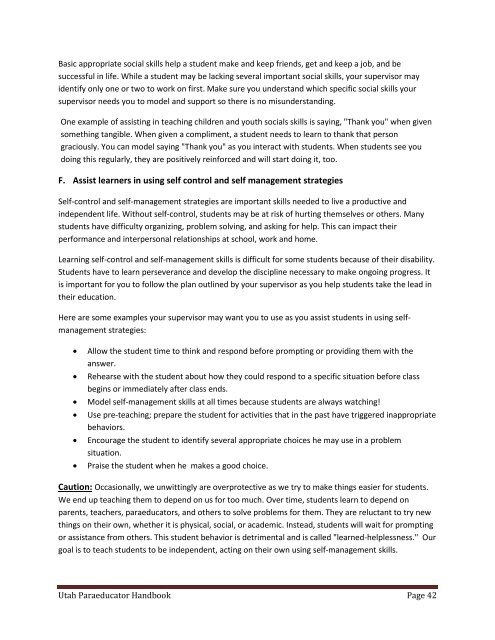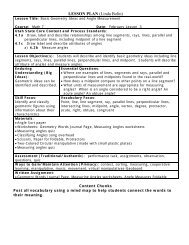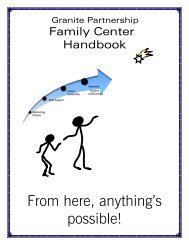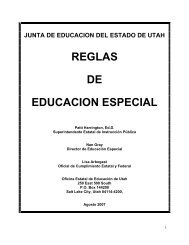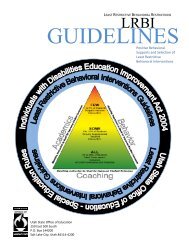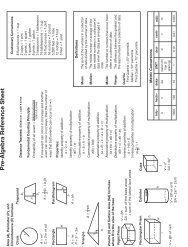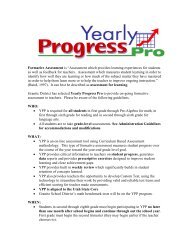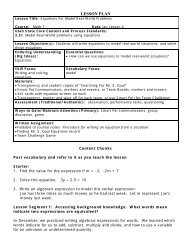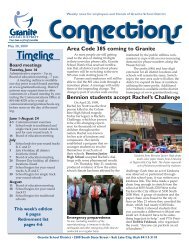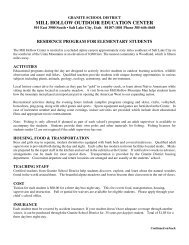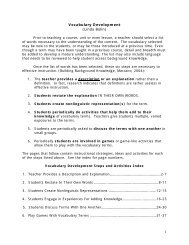Utah Special Education Paraeducator Handbook - Granite School ...
Utah Special Education Paraeducator Handbook - Granite School ...
Utah Special Education Paraeducator Handbook - Granite School ...
You also want an ePaper? Increase the reach of your titles
YUMPU automatically turns print PDFs into web optimized ePapers that Google loves.
Basic appropriate social skills help a student make and keep friends, get and keep a job, and be<br />
successful in life. While a student may be lacking several important social skills, your supervisor may<br />
identify only one or two to work on first. Make sure you understand which specific social skills your<br />
supervisor needs you to model and support so there is no misunderstanding.<br />
One example of assisting in teaching children and youth socials skills is saying, "Thank you" when given<br />
something tangible. When given a compliment, a student needs to learn to thank that person<br />
graciously. You can model saying "Thank you" as you interact with students. When students see you<br />
doing this regularly, they are positively reinforced and will start doing it, too.<br />
F. Assist learners in using self control and self management strategies<br />
Self-control and self-management strategies are important skills needed to live a productive and<br />
independent life. Without self-control, students may be at risk of hurting themselves or others. Many<br />
students have difficulty organizing, problem solving, and asking for help. This can impact their<br />
performance and interpersonal relationships at school, work and home.<br />
Learning self-control and self-management skills is difficult for some students because of their disability.<br />
Students have to learn perseverance and develop the discipline necessary to make ongoing progress. It<br />
is important for you to follow the plan outlined by your supervisor as you help students take the lead in<br />
their education.<br />
Here are some examples your supervisor may want you to use as you assist students in using selfmanagement<br />
strategies:<br />
<br />
<br />
<br />
<br />
<br />
<br />
Allow the student time to think and respond before prompting or providing them with the<br />
answer.<br />
Rehearse with the student about how they could respond to a specific situation before class<br />
begins or immediately after class ends.<br />
Model self-management skills at all times because students are always watching!<br />
Use pre-teaching; prepare the student for activities that in the past have triggered inappropriate<br />
behaviors.<br />
Encourage the student to identify several appropriate choices he may use in a problem<br />
situation.<br />
Praise the student when he makes a good choice.<br />
Caution: Occasionally, we unwittingly are overprotective as we try to make things easier for students.<br />
We end up teaching them to depend on us for too much. Over time, students learn to depend on<br />
parents, teachers, paraeducators, and others to solve problems for them. They are reluctant to try new<br />
things on their own, whether it is physical, social, or academic. Instead, students will wait for prompting<br />
or assistance from others. This student behavior is detrimental and is called "learned-helplessness." Our<br />
goal is to teach students to be independent, acting on their own using self-management skills.<br />
<strong>Utah</strong> <strong>Paraeducator</strong> <strong>Handbook</strong> Page 42


